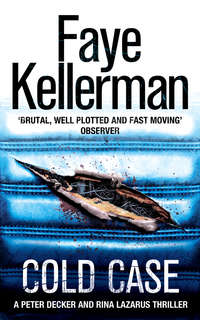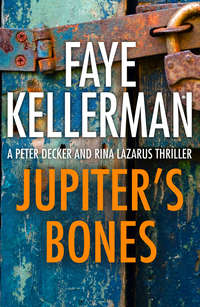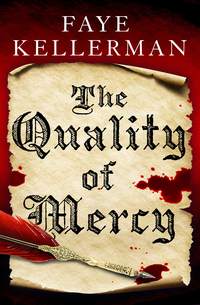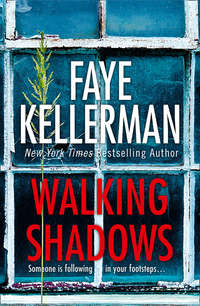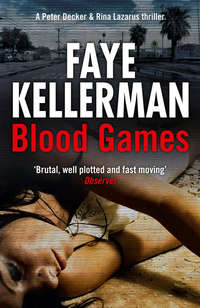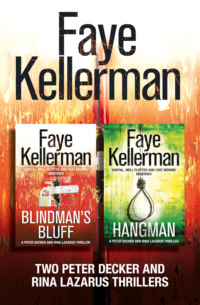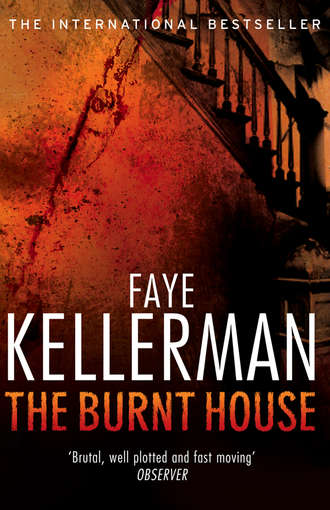
Полная версия
The Burnt House
“Blunt-force trauma,” Decker said. “Homicide.”
“Probably that would be my ruling if the body was in better shape. Right now I’m going with inconclusive because of all the extenuating circumstances.”
“How long has the body been lying there?” Oliver was up to number five in the fritter department. Last one, he swore to himself.
“If it would have been discovered before the fire, I would have had a much better idea. Now it is almost impossible for me to say.”
Decker twirled the ends of his mustache. He did that in order to prevent his hands from taking more dessert. “Can you at least tell us a race?”
“Possibly Caucasian, possibly Hispanic.”
Oliver said, “Well, in L.A., that’ll narrow it down to a few gazillion people.”
“Was she inside the wreckage of the building or was she found in the ground under the building?” Decker inquired.
“You’ll have to ask recovery, but I think there is still quite a bit of foundation left from the building. I can’t imagine why anyone would dig under the foundation and discover a body.”
“If she was found in the wreckage and not under the foundation, her death can’t be any older than the building,” Decker surmised. “So let’s find out when the building went up. Then we’ll go through the missing persons from that time forward. I’d like to send the skull out to a forensic reconstructionist and put a face on the bones.”
“The bones are too delicate. They would break under the impression material needed to make a cast of the skull. Then you would lose any forensic evidence that the original skull might produce.”
“This is a nightmare,” Marge said. “We finally find a missing body, but it isn’t Roseanne. Instead of one possible homicide, we now have two.”
Inwardly, Decker groaned. He hated cold homicides and this one was in deep freeze. But his main concern was dealing with Farley Lodestone. “Is there anything you can do to help us pinpoint a time of murder?”
“From the skeleton, no. But I think we have tremendous good luck in one regard.”
“The clothing!” Marge said.
“Yes, the clothing.” Darwin ate the last fritter and called for the check. “A chunk remained remarkably intact. No label but it seems that Jane Doe was wearing a shirt with lettering on the back. It was preserved because she was buried faceup and the shirt material was synthetic and not as prone to decay. I have it enclosed in a protective plastic bag. We can go back to my office and examine it under a microscope.”
Marta, the tattooed teenager, handed the bill to Darwin, but her eyes were on Decker. “Dessert okay?”
“Delicious.”
“Next time you come here, Germando can fix you up real good. No problem if you’re a vegetarian. We can do somethin’ for you.”
“I’ll keep that in mind.”
“Yeah, we get all kinds of requests nowadays. No this, no that, no this, no that … man, even the cholos are picky. Everyone’s tryin’ to cut down on the fat.”
THE L.A. COUNTY Coroner’s Office was on North Mission Road in the once-notorious Ramparts district, northeast of downtown L.A. The police substation was now squeaky-clean, but though the mark of Cain was fading, it wasn’t entirely gone.
The morgue was two buildings separated by a walkway, offices to the right, the Crypt on the left. A perennial swarm of black flies welcomed the visitor at the front doors. After the detectives signed in and donned protective garb, including shoe covers and face masks, Darwin took them down to the Crypt, the smell in the elevator growing stronger with every inch of descent. No matter how many times Decker had dropped by, it was the stink that always got to him.
The corridor was quiet, the doors of the foyer leading to the glassed-in autopsy rooms and the refrigeration area used for the storage of the bodies. Because of the tremendous glut of corpses, there were cadavers on gurneys in the hallways, most wrapped in plastic sheeting, but others were more visible, skin gray and growing mold.
The pathologist’s office was off the main hallway, set up like a galley-style kitchen with cabinets above and below, and stainless-steel countertops that spilled over with instruments of the trade—microscopes of various intensities along with scales, calipers, scalpels, tweezers, and camera equipment. There were seven jars containing body parts that floated in unnamed scientific liquids, mostly digits being rehydrated for fingerprinting. Darwin’s desk was tucked into a corner and was piled high with papers. The office provided adequate space for one person, but was crowded for four adults.
The activity centered around a microscope, the doctor and the detectives taking turns as they tried to make out details on a sullied piece of cloth. The swatch was roughly a six-inch square, most of it mud-colored. With the aid of the lens, Decker could see individual threads that still carried some of the original pink dye. Darwin reduced the magnification in order to make out the lettering, the clearest section directly in the middle of the fabric. The paint was rapidly flaking off.
Decker peered into the eyepieces. “Takes a little getting used to.”
“Yes, it does,” Darwin agreed. “But you can make out words.”
“I can make out letters.”
“What letters?” Marge took out her notepad.
“V-e-s …” A pause. “It looks like v-e-s-t-o-n.”
Marge wrote it down. “What else?”
“Underneath the v-e-s-t-o-n is d-i-a-n. Underneath that is a-p-o-l and underneath that is …” He let out a short breath. “I think it’s p-e-k …” He peered at the area with intensity. “Everything else is smudgy.”
Darwin said, “Look before the p in the p-e-k. I think there is an o.”
“Yeah … yes, I see it. So it’s o-p-e-k.”
“Opek?” Oliver said. “The oil cartel?”
“That’s o-p-e-c,” Decker told him.
Darwin said, “Look in the upper-left corner. You can also see lettering.”
Decker shifted the protected fabric and found the section that the pathologist was referring to. “Yes, I see it. A-j-o-r.”
“Exactly.”
“Anything else I should be looking for?”
“That’s all I could tell you at this magnification,” Darwin told him. “Perhaps we can scan it into the computer and it can bring up more information.”
“Good idea.” Decker pulled away from the instrument and rolled his shoulders. “Anyone else want to take a look?”
“I’ll take a crack at it,” Oliver said. The group waited in silence as Oliver looked over the fabric. “Yeah … that’s all I can make out as well.” He lifted his eyes from the lens. “Not exactly much to go on. The letters are obviously part of bigger words.”
Marge said, “We have to take the cloth in context.”
“What context?” Oliver asked.
“Well, for starters, what was the shirt used for?” Marge examined the fabric. “Because of the printing on it, I’d say that the garment was originally a T-shirt, a sweatshirt, or a jacket.”
Decker added, “Since the material is synthetic, my vote is with a jacket. T’s and sweatshirts are usually cotton.”
“I agree,” the pathologist said.
Marge continued to peruse the cloth. “There’s a lot of lettering on a single patch, and usually jackets don’t have long messages on the back. And the way the partial words are stacked on top of one another …” She got up from her hunched position. “To me that suggests some kind of list.”
Oliver said, “So what kind of list would be on the back of a jacket?”
Decker’s brain fired up. “Margie, let me see your notes for a second.” After reading her pad, he hit the paper with the back of his hand. “It’s like doing a gridless crossword without any clues. Still, if you do enough crosswords, your mind fills in the blanks. V-e-s-t-o-n. If I say it instead of spell it, it helps. Veston. How about the city, Galveston. For o-p-e-k, how about Topeka. D-i-a-n could be lots of things, but if we’re in that part of the country, I’d say Indianapolis.”
“Maybe that’s the a-p-o-l,” Marge suggested.
Decker said, “In any case, I think we’re looking at a tour jacket.”
“Sweet,” Marge said. “Unfortunately, we don’t know whose tour jacket. But we know that it was once pink. I’m betting it’s a girl group, a group with a girl as its lead singer or a solo girl.”
“Madonna?” Darwin said. “She was really popular.”
“She’s been around for a long time,” Marge said. “I bet there’s some nut out there who’s an expert on Madonna’s tours.”
“You picture Madonna going to Galveston?” Oliver asked.
“What’s wrong with Galveston?” Marge countered.
“Nothing,” Oliver said. “I’m sure it’s a great city except in hurricane season. Superficially, it just doesn’t seem like her crowd.”
“A country star,” Decker said.
“With Topeka and Galveston, I’d say that’s a good guess.”
Decker said, “How old do you think the jacket is?”
Darwin shrugged and the small lab fell silent. So many unanswered questions.
Oliver bent over and looked into the eyepieces, adjusting the lens for stereoscopic vision. He shifted the cloth to the upper-left corner, reading the letters aloud. “A-j-o-r. These letters are bigger and not stacked. I don’t think this word is part of the list of cities. So the question is …” He looked up. “What are these letters and I’m saying … that maybe the letters indicate the band.”
“Ajor,” Marge said out loud. “Maybe major?”
“Shit!” Oliver hit his head. “Oh man! What about Priscilla and the Major?”
“Now there’s a blast from the past,” Decker said.
“Who?” Marge and Darwin asked simultaneously.
“They were a singing duo in the seventies. They played soft rock, if I had to categorize it, but they were very popular with the country circuit because he was a retired army major and very patriotic.”
“He played guitar, but she was the star,” Oliver said. “They were big in their time.”
“True,” Decker said, “although I don’t think I ever bought one of their albums.”
“Albums,” Marge said. “Now you’re really dating yourself.”
“They came in somewhere between acid rock and disco,” Oliver told her. “They were a nostalgic group even in those times.”
“You know a lot about them,” Marge told Oliver.
“My ex liked them,” Oliver said. “Me? I never bought any of their albums, either, but I remember Priscilla as being a fox. That’s old-speak for being a hottie.”
10

LET ME THINK out loud for a moment.” Decker sat at his desk. Across from him were Marge and Oliver, awaiting further instructions. “Two cases: Jane Doe and Roseanne Dresden. Jane is a homicide … Roseanne?” He shrugged. “We’re reserving judgment on her. Recovery’s still digging, but it’s been a while. Someone has to talk to the husband.”
“And ask him what?” Oliver asked. “Did you kill your wife?”
Decker answered, “The fact is we don’t know if she’s even dead. We do suspect that the Dresden marriage was in trouble. David Rottiger and Arielle Toombs said that the couple was headed for divorce. Plus, Arielle told me that Roseanne had broken up with a paramour named Raymond Holmes six months prior to her death. She said he didn’t take it well. For all we know, he could be involved.”
A pause.
“We have to approach Ivan Dresden in a nonthreatening way. I think it’s far more likely that he’ll talk to us if he thinks we’re investigating a missing person rather than a homicide. So far that’s true.”
Marge said, “If the guy is as money hungry as all say, we can tell him insurance won’t settle until they find a body.”
“That’s probably true,” Oliver said.
“Up to a point,” Decker said. “Anyway, we can tell him that the police are investigating her whereabouts for insurance purposes. Since her body hasn’t turned up, we’re thinking that she may be alive.”
Oliver said, “What are we after, Loo?”
Decker said. “First, we need to hear his story. Second, it would be helpful if we could obtain his permission to pull phone records, credit-card receipts, bank records, to see if there’s been any activity since she disappeared. We can tell Ivan that it will be an important part of the insurance investigation.”
“Do we bring up the old flame, Ray?” Marge asked.
“Use your discretion.”
Marge said to Oliver, “You call up Ivan or should I?”
“You can do it. I’d rather call up Ivan’s lap-dancer friend.”
“Lap-dancer friend?” Decker asked.
“Yeah, David Rottiger told me Ivan had a thing for a lap-dancer friend of his. Ivan met her at one of Rottiger’s parties.”
“Interesting.” Decker nodded. “Do you have name?”
“No, Rottiger wouldn’t give it to me, and at the time, there was no reason to push. But I know where she works and I’d be happy to conduct a field interview with her.”
“I bet.” Decker smiled. “Actually, she may be a legitimate source of info later on. But first talk to Ivan. And see if you can conduct the interview in his condo because it’ll give you an opportunity to see the way he’s living. Get on his good side. We’re trying to wrest permission from him to look at Roseanne’s paperwork. Once we sort through all the credit slips, the bank statements, and the phone records, we’ll get a clearer idea about her last days.”
Oliver said, “Have you told Farley Lodestone about the latest developments?”
“Not yet.” Decker sighed. “This is not going to improve his trust in the justice system. If he wasn’t so bereaved, I’m sure he’d gloat.”
Marge said, “You know, if Roseanne was on flight 1324, there could be someone who worked the gate that remembers seeing her board the plane. I’d like to go down to WestAir’s airport counter next week and talk to the desk people.”
“They’re only going to refer you to the task force,” Oliver said.
“Maybe woman-to-woman, I can get some information. Now that Roseanne’s been missing for so long, I’d like to take one more crack at it.”
Decker said, “I think it’s a good idea. So we’ve got some strategies mapped out with Roseanne. Let’s move on to problem number two—our skeletal Jane Doe, who was probably a homicide. We need to identify the body and we can’t put a face on the bones because the bones are too delicate to mess with. So what can we do? We can find out when the apartment building went up. We can also locate someone involved with Priscilla and the Major to see if we can date the jacket.”
“Wanda Bontemps is on the computer trying to get a bead on the singing duo,” Marge said. “I did manage to Google them right before the meeting. Over five hundred thousand references, but no official Web site. How old would either of them be?”
“Sixties.” Not all that far from his age, Decker thought. “While Wanda is tracking down the duo, somebody needs to go down to building and safety and find out when the apartment building went up. Let’s go with Lee Wang and Jules Chatham. Both of them are good with bureaucracy, paper shuffling, and details.”
“Chatham is on vacation,” Marge said. “I think Lee is at his desk. I’ll talk to him.”
Oliver said, “You’re talking about a twenty-five-maybe thirty-year-old building. That’s a lot of tenants, Loo.”
“Someone must have a record of everyone who rented there for tax purposes. Talk to the current owners and work backward. I’ll draw up an assignment schedule. We can confer again tomorrow morning. Maybe by then Wanda will have found a location for Priscilla and the Major.”
“Are you going to wait until the morning to call Lodestone?” Oliver asked.
“No, I’m going to call Lodestone as soon as you leave. Then I’m going to go home and forget about all this stuff. It’s Shabbos tonight and that means I get a day of rest. And even if I don’t get my day of rest, I’m at least entitled to a last supper.”
MUNCHING A PEANUT-BUTTER-AND-BANANA sandwich, Wanda was still at the computer when Oliver and Marge came out of Decker’s office. She didn’t bother to look up from the screen as she spoke. “The wonders of modern technology. Almost everyone in the universe is just a click away.”
Oliver said, “What have you found out about them?”
“First off, the original duo is a thing of the past. The original Major—Huntley Barrett—has been dead for twelve years. Priscilla used to perform with another guy, Kendrick Springer, but the fans and the reviewers didn’t like him at all. You should read the comments.” She shook her head in dismay. “Passions ran very high about Huntley’s replacement.”
“Does Priscilla still perform?” Marge asked.
Bontemps shrugged. “That’s an interesting question. She doesn’t have an official Web site, but she does have an agent. I can’t find any current concert dates for her. Last one I found was seven years ago.” She looked at her notepad, tore off the top sheet of paper, and gave it to Oliver. “Her agent.”
Oliver glanced at the slip of paper. Miles Marlowe with a phone number. It was after six and Marlowe was probably gone, but he’d leave a phone message. “Anything else?”
She handed him a four-inch stack of paper. “Everything I’ve pulled up and thought worth printing, I printed for you.”
“Jeez, I feel a little guilty.” Oliver hefted the pile. “Like I just nuked a forest or something.”
Bontemps smiled. “Sir, don’t take this wrong, but I would have never thought you to be the environmentally conscious type.”
“Don’t tell anyone, Wanda, but I even recycle.”
PRISCILLA AND THE Major’s last top-ten song had been recorded over twenty-eight years ago, but they had left behind a rich legacy of blogs, K-Right (order by toll-free number, only available through this TV offer) boxed-set CDs, and a host of sixtysomething fans wishing nostalgically for singable melodies and clean lyrics. As Oliver read through the stack of computer information, he discovered that though the couple had divorced, they had remained friendly up to the day the Major had died. Priscilla had moved to Florida specifically to minister to him during the final months of his life. As a result, the Major, the business brains behind the duo’s success, had left her his very sizable estate, including a collection of sixty vintage guitars, most of which Priscilla had auctioned off. There had been a daughter and it had been big news when Priscilla had given birth, but what happened to the girl was anyone’s guess.
After going through the material, Oliver stored the sheaves of paper in the newly created Jane Doe folder, and was just turning the key to his desk’s lone file cabinet when his cell rang. The window displayed a number that looked familiar, although he had no idea who was on the line. Since it was his cell and not the desk phone, he answered it by the regular hello rather than “Oliver.”
“I’m looking for a … a Detective Scott Olivier.”
Pronouncing it like the great, late actor. Oliver liked that. It gave him gravitas. “This is Detective Oliver. Who am I talking to?”
“Miles Marlowe. Uh, it’s says here on my message that you called regarding Priscilla Barrett?”
“I did—”
“Well, she isn’t interested in taking on any partners.”
“That’s good because I’m not interested in being her partner.” Oliver held back a laugh. “Where’d you get that idea?”
“Because you called yourself detective.”
“That’s because I am a detective.”
“A real one?”
This time Oliver let go with a chuckle. The man sounded old and feisty. “Yes, a real one, Mr. Marlowe. I’m with Los Angeles Police Department and—”
“Well, you’ve got to understand what I’m dealing with,” Marlowe interrupted. “All sorts of wannabes calling me to partner with Priscilla and they all got titles. I’ve had sergeants, I’ve had captains, colonels, and lieutenants. I’ve even had some royalty: two princes and one duke. I thought you were one of those. You know … remaking my lady into Priscilla and the Detective.” A couple of quick, short breaths—a smoker or emphysema. “Not a bad ring, but it sounds more like a TV show than a singing duo. Anyway, what do you want with my lady?”
“I’d like to talk to her, sir.”
“Why?”
“It’s part of an ongoing investigation. I only need a little bit of Priscilla’s time.”
“Nothing grisly in the investigation, I hope. She’s a delicate soul.”
“Nothing grisly at all,” Oliver lied. “I’ve been doing some homework on her. Last I checked, she was living in Vegas.”
“She was in Vegas for a while. Drew really big crowds, but she decided it wasn’t for her. Like I told you, she’s a delicate soul.”
“Understood, sir. Anyway, being an old fan as well as a detective, I thought I could talk to her—”
“I thought there was an ulterior motive. The woman still has the ‘it’ factor.”
“I’m sure she does,” Oliver said, “but I assure you I have no ulterior motive—”
“Well, this is what I’m gonna do for you. I’ll give her this number. She’ll call you when she’s ready.”
“I think I’m going to need a face-to-face, sir, and the sooner the better. If you want, I’ll be happy to call her up directly.”
“You want to talk to Priscilla, you go through me. For all I know, you could be an agent, trying to steal my lady. You just want to meet her, Detective Olivier. Don’t deny it!”
Oliver decided to lay on the schmaltz. “Okay, Mr. Marlowe, you got me. I’d love to meet your lady.”
“Now that you admitted it, we can get somewhere. So how do I know you are who you say you are?”
Oliver said, “Sir, why don’t you come down to West Valley Division of LAPD and we’ll go together to meet the lady. That way you’ll see that I’m legitimate and you can see I actually work as a detective.”
“Hmm …” Marlowe pondered the suggestion. “All right. I suppose I could come down and check you out in the flesh. If you’re legit, you can follow me to her house. She happens to live in the West Valley … Porter Ranch.”
“Does she, now? Well, that’s certainly convenient for all of us.”
“Not for me. I work in Hollywood.”
“Then I appreciate your taking the time to go out of your way to introduce us. It’s really not necessary, especially since I’m so close—”
“Now don’t you be getting any ideas about popping in on her, Detective Olivier. It’s a gated community with full-time guards.”
“I wouldn’t do that, sir, that would be stalking. When is it convenient to meet you?”
“It’s not my convenience, Detective, it’s Priscilla’s. I’ll call her up and call you back.”
“That sounds fine, Mr. Marlowe.”
The phone hung up abruptly. Ten minutes later, just as Oliver was pulling his Chrysler PT Cruiser convertible out of the police parking lot, his cell rang.
“How about Monday at three?”
It was Marlowe, no introduction necessary. Oliver said, “Sounds great. Thanks for setting it up so fast.”
“I’ll come out to the police station to meet you. But no monkey business or I’ll have your badge.”
“You’re welcome to it,” Oliver whispered.
“What?”
“Thank you very much, Mr. Marlowe, you’ve been a big help.”
11

THE KINDLING OF the candles signified the onset of the holy day of rest, welcoming the Shabbat bride with song and food. Showered and shaved, Decker felt clean and renewed. Since he’d decided not to go to synagogue, he dressed casually—a pair of khaki pants, a black polo shirt, and sandals. His stomach rumbled from the aromas emanating from the kitchen, and his mouth was watering by the time he sat down at the table. Seven place settings of china and crystal: Rina had done the centerpiece herself, the arrangements courtesy of her new hobby. She had turned their backyard into an English garden. The colors and the bouquets were dizzying. Insects and birds abounded. She called it their personal Eden.


